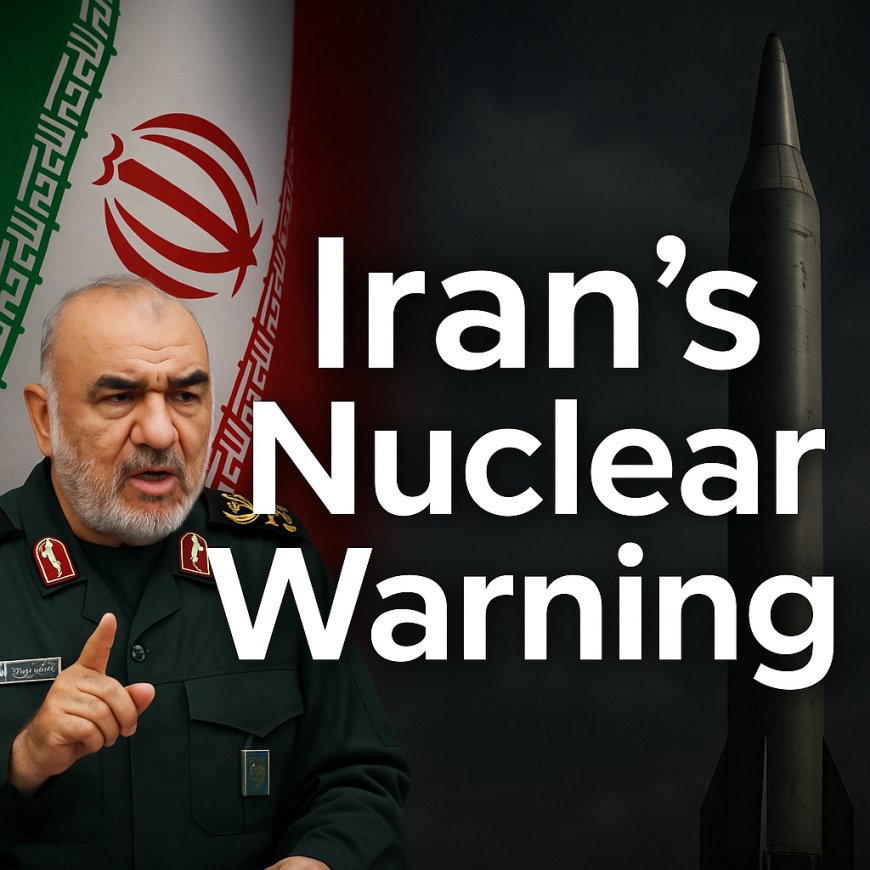Iran Issues Strong Warning to the United States Amid Rising Tensions
Iran's Revolutionary Guard Commander delivers a powerful warning to the United States, asserting Tehran's military readiness and condemning American policies in Gaza, Ukraine, and beyond. Discover the geopolitical implications and future scenarios.

In a climate of escalating global conflicts and shifting alliances, Iran has once again captured the world's attention with a bold and uncompromising warning directed at the United States. This announcement comes from none other than Hossein Salami, the commander of the Islamic Revolutionary Guard Corps (IRGC), who declared that Iran is fully prepared for any military confrontation with Washington. According to Salami, Tehran’s military strength has multiplied tenfold over the past year, significantly deterring adversaries from considering an attack against the Islamic Republic.
The Current Geopolitical Context: More Than Just Three Major Conflicts
While much of the international media focuses on the conflicts in Gaza, Ukraine, and the brewing crisis between China and Taiwan, over 40 armed confrontations continue to rage across various regions of the world. Within this turbulent global environment, Iran stands out as one of the most vocal and strategically significant players, especially given its ties to key international actors like China and Russia.
China’s Growing Influence in Middle Eastern Affairs
Recently, China's Foreign Minister Wang Yi held a significant meeting with his Iranian counterpart in Beijing, during which he openly condemned unilateral sanctions imposed by the United States and reaffirmed China's support for Iran. This diplomatic move not only strengthens the Iran-China alliance but also introduces a new dynamic into the ongoing negotiations between Tehran and Washington over Iran’s nuclear program.
Adding to this geopolitical complexity, Iran delivered a personal message from President Ebrahim Raisi to Chinese leader Xi Jinping, further signaling the depth of their growing strategic partnership. China’s support could prove pivotal in emboldening Iran’s defiance against Western pressures, especially those exerted by the Biden administration.
Hossein Salami's Declaration: Iran’s Military Readiness and Strategic Priorities
In a televised address that captured headlines across the Middle East, Commander Hossein Salami asserted that Iran's military power has reached unprecedented levels, with advanced missile systems, cyber capabilities, and regional proxy forces that pose a credible threat to American interests in the region. Salami emphasized that the IRGC's operational strength has grown exponentially, effectively deterring any thoughts of direct military aggression by Washington.
The Role of Regional Conflicts in Tehran’s Strategy
Salami didn’t limit his remarks to military capacity alone. He also criticized U.S. policies in regions such as Gaza and Ukraine, accusing the American administration of fueling conflicts without achieving meaningful outcomes. According to Salami, these failures expose the flaws in Washington’s foreign policy and underscore the necessity for regional powers like Iran to assert their sovereignty and security interests independently.
The Nuclear Issue: A Flashpoint for Future Confrontation
Despite ongoing negotiations aimed at reviving the 2015 Joint Comprehensive Plan of Action (JCPOA), Iran maintains its firm position on preserving national dignity and strategic autonomy. Salami reiterated that while Iran remains committed to its principles, it would not tolerate any compromise that undermines its sovereignty. Western suspicions about Iran’s nuclear ambitions persist, although Tehran continues to insist that its program is purely for civilian purposes.
U.S. Strategy: Pressures, Sanctions, and Diplomatic Isolation
The Biden administration has pursued a dual-track approach, combining diplomatic engagement with economic sanctions and military deterrence. However, the effectiveness of this strategy is increasingly questioned, especially as Iran consolidates its regional alliances and forges deeper ties with non-Western powers such as China and Russia.
What This Means for Washington and the Middle East
The implications of Salami’s warning are profound. For Washington, it signifies a potential escalation point that could further destabilize an already volatile region. Any miscalculation or provocation might ignite a broader conflict, drawing in U.S. allies in the Gulf and complicating efforts to manage crises in other theaters like Ukraine and the Indo-Pacific.
The Potential for Proxy Escalation
One of the most immediate risks lies in the activation of Iranian-backed proxy militias across the region. Groups like Hezbollah in Lebanon, the Houthis in Yemen, and various Shia militias in Iraq could be mobilized to target American assets and allies, heightening tensions and complicating U.S. strategic calculations.
The Diplomatic Front: Negotiations Amid Hostilities
Despite the incendiary rhetoric, diplomatic efforts persist. Backchannel talks reportedly continue between Iranian and American officials, with intermediaries such as Oman and Qatar facilitating communications. However, the window for a peaceful resolution is narrowing as both sides harden their positions and external actors like China influence the calculus.
China’s Role as a Strategic Balancer
Beijing’s involvement in Middle Eastern affairs marks a significant departure from its traditionally cautious approach. By aligning with Tehran, China not only secures energy interests but also positions itself as a counterweight to American influence. This development introduces a new layer of complexity to regional diplomacy and could either stabilize or further inflame tensions, depending on how events unfold.
A Perilous Road Ahead
The stark warning issued by Hossein Salami underscores the fragile nature of the current geopolitical landscape. As Iran flexes its military muscles and deepens alliances with global powers like China, the risk of confrontation with the United States grows. The coming months will be crucial in determining whether diplomacy can prevail or if the region edges closer to a wider conflagration.
What's Your Reaction?
 Like
0
Like
0
 Dislike
0
Dislike
0
 Love
0
Love
0
 Funny
0
Funny
0
 Angry
0
Angry
0
 Sad
0
Sad
0
 Wow
0
Wow
0































